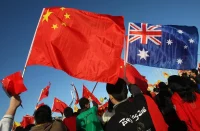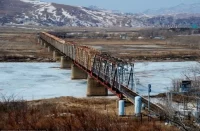The radioactive dust had not yet settled after the explosion at the Fukushima nuclear power plant when Japanese Prime Minister Naoto Kan gave a speech saying it was inappropriate to compare the crisis at Fukushima-1 with the accident at Chernobyl in 1986. He said the amounts of radiation released then and now are not comparable, and Japan’s situation is fundamentally different from Chernobyl.
Here is the sequence of events. On March 11, 2011, there was an earthquake that caused the cooling system at the Fukushima plant to fail. The first explosion at the plant occurred on Saturday, March 12. A hydrogen explosion partially destroyed Reactor 1. Kan spoke on Sunday, March 13. On Monday, March 14, there was an explosion at Reactor 3. On Tuesday, March 15, there was another explosion at the plant, this time at Reactor 2.
So here’s the deal: the reactors at Fukushima-1 are exploding with a vengeance; 170,000 Japanese are being evacuated on an emergency basis from nearby areas; and ships of the US 7th Fleet are hurrying out of the danger zone because of the threat of radioactive contamination. Kyodo News reports that Fukushima-1 is releasing an annual dose of radiation into the atmosphere every hour, and Kan reassures the honorable public that it isn’t a Chernobyl. And you know, he’s right.
This is not Chernobyl; this is Fukushima.
Imagine this. A man’s house catches on fire. The family rushes the children into the street and drags household goods out to a safe place. Firefighters work to put out the fire. Neighbors come running to help anyway they can. And the man tells everybody that the fire is nothing to worry about, that everything is fine, that when Ivan’s house burned down last year it was a real fire; but that it happened because Ivan is a communist and a barbarian. He doesn’t understand our culture and doesn’t admire Mount Fuji on Saturdays.
Get the picture?
Now think about how accurate the homeowner was and how right Prime Minister Kan is, to say the least. Is he anything but a lowdown sociopath?
Let’s see what the Japanese media had to say about Chernobyl. “Savages cannot be allowed to have nuclear technologies.” “What happened at Chernobyl cannot happen in Japan on principle.” “The communist dictatorship is lying about the situation in Chernobyl.” “The KGB is being used to force millions of slaves to deal with the accident at the point of machine guns.” “Half of the USSR has been turned into a radioactive desert.” Those are the kinds of things the Japanese press was saying at the time.
Of course, it’s very easy to say a Chernobyl-style disaster couldn’t happen in Japan so long as there hasn’t actually been one. Likewise, I can argue that I’ll never have a car accident until I actually get into one.
Chernobyl definitely isn’t the same as Fukushima-1. In Chernobyl, human error was the cause, namely the kind of bungling that we might easily suspect of being sabotage. We can name the people responsible for the Chernobyl disaster.
Things aren’t so straightforward with Fukushima. Nevertheless, human error was at work there, too. The fact is that Japan has had seven magnitude 8 or higher earthquakes since 1891. True, this 8.9 tremor was more powerful than all of Japan’s previous earthquakes according to Central Queensland University Adjunct Professor Kevin McCue. However, no one would argue that earthquakes are unusual in the Land of the Rising Sun. Japan shakes; it shakes strongly, and it shakes frequently. Only people who know nothing about the country would imagine otherwise.
The great earthquake that happened in the Kanto plain (where Tokyo is located) as recently as 1923 provides a good illustration of the seismic situation in Japan. That earthquake was the most destructive in Japanese history in terms of the amount of destruction it caused and the number of people who suffered.
Its epicenter was 90 km southwest of Tokyo, in Sagami Bay. It produced 12-meter tsunami waves. About 40,000 people died of suffocation in one Tokyo square alone when the buildings surrounding it went up in flames. The earthquake and subsequent fires almost completely destroyed Tokyo, Yokohama, Yokosuka and eight smaller cities. The official number of dead was 174,000. Another 542,000 were missing, and more than 1 million were left homeless. The property damage sustained by Japan as a result of the Kanto earthquake was estimated at twice its annual budget at the time.
What did the Japanese government and Japanese scientists and engineers conclude from all that? Can anyone seriously argue that the Japanese corporations and government didn’t understand the seismic hazards to construction in the Japanese archipelago? Of course they did. They had to know, and they did know. Here’s the problem.
According to Richard Black, a BBC commentator on environmental issues, Japan’s nuclear industry, like its counterparts in many other countries, hasn’t been renowned for openness and transparency, “Tepco itself has been implicated in a series of cover-ups down the years. In 2002, the chairman and four other executives resigned, suspected of having falsified safety records at Tepco power stations. Further examples of falsification were identified in 2006 and 2007.” In Russia we love to talk about the Russian “maybe,” but we don’t understand that the Japanese “maybe” is something more spectacular and astounding than our gloomy Russian carelessness. No one is now willing to admit that Japan’s nuclear industry is nothing less than a powder keg sitting under the well-being of all mankind. What do you think, how likely is it that all Japanese nuclear power plants will now be rapidly and radically rebuilt with consideration for the actual seismic hazard present in the Japanese archipelago? How much would it cost, and would Japanese society pay for it? When will there be another earthquake like this one or like the Kanto quake? Will it happen in 100 years? Will it be next year? Next month?
Oh no, Fukushima is certainly not a Chernobyl. You can be certain of that. After Japan’s prime minister made his stunning revelation, the press in Russia and the entire world came out with articles that had headlines that played off his statement.
In an article entitled “Fukushima no Chernobyl?” Ivan Osipov and Mikhail Levin opined that the accident at Fukushima-1 more closely resembles the one that occurred in 1979 at America’s Three Mile Island nuclear power plant (a five on the IAEA’s scale). “The reactor cooling system at Three Mile Island failed (the emergency pumps were undergoing repair) just as in Japan. That caused the fuel assembly to begin overheating, and radioactive steam and explosive hydrogen were released. At the time, 140,000 people were evacuated from the risk zone, but tragic consequences were avoided. Let us hope that the Japanese scenario turns out to resemble the accident in the United States more than the one in the Soviet Union.”
Well, what else can we do? Just hope.
But why didn’t Kan say the Fukushima-1 accident was like the one at Three Mile Island? I believe he didn’t want to damage relations with his North American patrons, who would get really angry at the reference. But it was perfectly okay for him to insult Russia, and at a time when the Japanese nuclear industry’s descent into hell hasn’t yet been halted.
And Russia?
As far as Mother Russia is concerned, it’s traditional for her to show a lively interest in Japanese affairs and assist her injured neighbor in every way possible.
On March 11, the public affairs office of Russia’s Emergency Situations Ministry announced that it was prepared to assist earthquake-stricken Japan through UN channels. “All the forces of the Ministry of Emergency Situations have put on alert to respond if needed. Russia is ready to provide Japan with needed humanitarian aid through UN channels if Japan requests it,” said a ministry spokesman.
On March 13, Rosatom said Russia is willing to give Japan any assistance in the field of nuclear safety to resolve problems at the troubled power plant. “Russian experts are standing by to render any engineering and analytical assistance in the field of nuclear safety to resolve the emergency situation at the plant. Offers of rapid assistance will be directed to their Japanese partners.”
At a March 18 Security Council session, Russian President Dmitry Medvedev said Russia is willing to give Japan humanitarian assistance in the form of foodstuffs, water and medicine. He also said injured Japanese, including children, should be placed in Russian sanatoriums.
On March 23, Russian Deputy Prime Minister Igor Sechin met with Japan’s Ambassador to Russia Masaharu Kono, during which he reaffirmed Russia’s willingness to assist Japan wherever our Japanese partners would like help. Sechin said that for Russia “the situation is a test of true friendship and true human relations, and we believe that in this situation we must support you and offer assistance in all areas.”
And so forth.
The reaction of the Russian media doesn’t in the least resemble the articles in the Japanese press during the Chernobyl emergency that were full of troglodyte hatred; on the contrary, they’ve been full of compassion and goodwill.
The point is that after two decades of market reforms the Russian people have begun taking a much harder look at their surroundings. The media doesn’t reflect the sentiments found in, for example, Russian social networks and on Internet forums. Unfortunately, expressions like “it serves them right” directed at Japan are not as rare as we might like. What’s behind that negative attitude?
Just this. The negative sentiments in Russian society have been overwhelmingly provoked by Japan itself, which relates to its neighbors like a teenager burdened with the problems of adolescence. Tell me honestly, how is it that some Japanese revanchists got away with shooting at the Russian Embassy and ripping up the Russian flag, and how could Japanese officials like Naoto Kan say provocative things like Fukushima is no Chernobyl?
Sure, we know that Fukushima is no Chernobyl; however, we can’t yet say with certainty how they differ, especially in terms of their impact.
In my opinion, Japan’s political class will face tough decisions on energy in the aftermath of the events at the Fukushima power plant, and improving relations with Russia would be a good idea.
But that’s a subject for another article.
Source: New Eastern Outlook














Comments